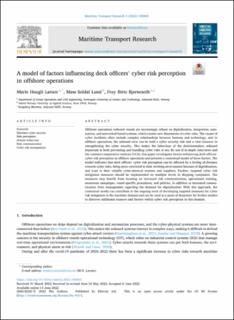| dc.contributor.author | Larsen, Marie Haugli | |
| dc.contributor.author | Lund, Mass Soldal | |
| dc.contributor.author | Bjørneseth, Frøy Birte | |
| dc.date.accessioned | 2022-09-14T12:33:33Z | |
| dc.date.available | 2022-09-14T12:33:33Z | |
| dc.date.created | 2022-06-22T08:10:38Z | |
| dc.date.issued | 2022 | |
| dc.identifier.citation | Maritime Transport Research. 2022, 3 . | en_US |
| dc.identifier.issn | 2666-822X | |
| dc.identifier.uri | https://hdl.handle.net/11250/3017849 | |
| dc.description.abstract | Offshore operations onboard vessels are increasingly reliant on digitalization, integration, automation, and networked-based systems, which creates new dimensions of cyber risks. The causes of cyber incidents often include complex relationships between humans and technology, and in offshore operations, the onboard crew can be both a cyber security risk and a vital resource in strengthening the cyber security. This makes the behaviour of the decisionmakers onboard important in both preventing and handling cyber risks at sea. By use of in-depth interviews and the constant comparative analysis (CCA), this paper investigates factors influencing deck officers’ cyber risk perception in offshore operations and presents a contextual model of these factors. The model indicates that deck officers’ cyber risk perception can be affected by a feeling of distance towards cyber risks, being more restricted in their working environment because of digitalization, and trust in their reliable cyber-physical systems and suppliers. Further, targeted cyber risk mitigation measures should be implemented on multiple levels in shipping companies. The measures may benefit from focusing on increased risk communication, operational training, awareness campaigns, vessel-specific procedures, and policies, in addition to increased communication from management regarding the demand for digitalization. With this approach, the contextual model can contribute to the ongoing work of developing targeted measures for cyber risk mitigation in the maritime domain and can be used as a point of departure for further studies to discover additional nuances and factors within cyber risk perception in this domain. | en_US |
| dc.language.iso | eng | en_US |
| dc.rights | Navngivelse 4.0 Internasjonal | * |
| dc.rights.uri | http://creativecommons.org/licenses/by/4.0/deed.no | * |
| dc.subject | Maritime cyber security Risk perception Human behaviour Risk communication Cyber risk management | en_US |
| dc.subject | Maritime cyber security | en_US |
| dc.subject | Risk perception | en_US |
| dc.subject | Human behaviour | en_US |
| dc.subject | Risk communication | en_US |
| dc.subject | Cyber risk management | en_US |
| dc.title | A model of factors influencing deck officers' cyber risk perception in offshore operations | en_US |
| dc.title.alternative | A model of factors influencing deck officers' cyber risk perception in offshore operations | en_US |
| dc.type | Peer reviewed | en_US |
| dc.type | Journal article | en_US |
| dc.description.version | publishedVersion | en_US |
| dc.subject.nsi | VDP::Samfunnsvitenskap: 200 | en_US |
| dc.source.pagenumber | 11 | en_US |
| dc.source.volume | 3 | en_US |
| dc.source.journal | Maritime Transport Research | en_US |
| dc.identifier.doi | 10.1016/j.martra.2022.100065 | |
| dc.identifier.cristin | 2034073 | |
| dc.relation.project | Norges forskningsråd: 237929 | en_US |
| dc.source.articlenumber | 100065 | en_US |
| cristin.ispublished | true | |
| cristin.fulltext | original | |
| cristin.qualitycode | 1 | |

